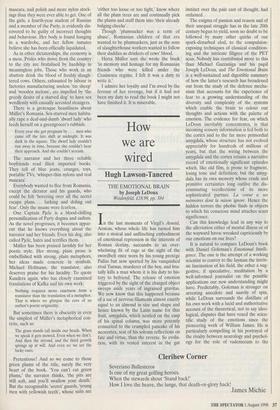Rogues and peasant slaves
Patrick Skene Catling
THE LAND OF GREEN PLUMS by Herta Muller, translated by Michael Hofmann Granta, £9.99, pp. 242 Milan Kundera, in Testaments Betrayed, complained that Orwell's Nine- teen Eighty-Four reduces life to politics and politics to propaganda. 'It reduces (and teaches others to reduce) the life of a hated society to the simple listing of its crimes.'
The same complaint may be levelled at The Land of Green Plums, a novel that is similarly reductive. Herta Muller won this year's International Impac Dublin Literary Award, the world's biggest fiction prize (1R£75,000 for her, 1R£25,000 for Michael Hofmann). I don't want to give the impres- sion that this review comes from the Land of Sour Grapes. But still. . .
Muller was born in Romania in 1953. Her account of oppression and all sorts of deprivation in Romania during the years of the Ceausescu regime is based on her own experience there at that time. A teacher who dissented from official orthodoxy, she was dismissed from her job for non-co- operation with the Securitate, the not very secret police. They threatened her even after she was able to migrate to Germany. The Ceausescu police state was indeed abominable.
At the end of this century of technically advanced police surveillance, inquisition and execution, Miiller's novel anatomises, once again, the horrors we have long sym- pathetically deplored. There seems to be a taboo against adverse criticism of the liter- ature of the gulag; praise sometimes seems obligatory. It is therefore with some trepi- dation that I venture to say that flogging dead jellyfish, even when done expertly and with righteous passion, is an unedifying spectacle which provides dreary material for fiction or memoirs presented as fiction.
The narrator of this grim work of faction lives with five other girls in 'a little cube of a room', one of 40 in a large dormitory. In the ceiling of each room, a loudspeaker blares 'workers' choruses' all day. 'Some- one said, the loudspeakers see and hear everything we do.'
Romania suffered under Nazi oppres- sion; then it was suffering under commu- nism. The girls longed for the important trivial luxuries of the West — hairspray, mascara, nail polish and more nylon stock- ings than they were ever able to get. One of the girls, a fourth-year student of Russian and a member of the Party, is evidently dis- covered to be guilty of incorrect thoughts and behaviour. Her body is found hanging in a wardrobe, and her fellow inmates believe she has been officially liquidated.
As in other dictatorships, the economy is a mess. Proles who move from the country to the city are brutalised by hardship in meaningless jobs. Those who work in an abattoir drink the blood of freshly slaugh- tered cows. Others, exhausted by labour in factories manufacturing useless 'tin sheep' and 'wooden melons', are impelled by 'the greedy desire of a starved dog' to have sex wordlessly with casually accosted strangers.
There is a grotesque beastliness about Miiller's Romania. Sex-starved men habitu- ally rape a deaf-and-dumb 'dwarf lady' who feeds herself on a greengrocer's rubbish:
Every year she got pregnant by . . men who came off the late shift at midnight. It was dark in the square. The dwarf lady couldn't run away in time, because she couldn't hear their approach. And she couldn't scream.
The narrator and her three reliable boyfriends read illicit imported books. They tell of blue jeans, oranges, toys, portable TVs, 'whisper-thin nylons and real mascara'.
Everybody wanted to flee from Romania, except the dictator and his guards, who could be felt 'hovering over all the secret escape plans. . . lurking and doling out fear'. Only the insane were fearless.
One Captain Pjele is a blood-chilling personification of Party dogma and sadism. As the novel progresses, it becomes appar- ent that he knows everything about the narrator and her friends. Even his dog, also called Pjele, hates and terrifies them.
Milner has been praised lavishly for her poetic style. Her strong, plain prose is embellished with strong, plain metaphors, her ideas made concrete in symbols. Michael Hofmann, the translator, also deserves praise for his lucidity. To quote Kundera again, who has closely examined translations of Kaflca and his own work:
Nothing requires more exactness from a translator than the translation of a metaphor. That is where we glimpse the core of an author's poetic originality.
But sometimes there is obscurity in even the simplest of MUller's metaphorical con- ceits, such as:
The grass stands tall inside our heads. When we speak it gets mowed. Even when we don't. And then the second, and the third growth springs up at will. And even so: we are the lucky ones. ■
Pretentious? And so we come to those green plums of the title, surely the very heart of the book. 'You can't eat green plums,' the narrator thinks, 'the pits are still soft, and you'll swallow your death.' But the recognisable 'secret' guards, 'young men with yellowish teeth', whose suits are 'either too loose or too tight,' know where all the plum trees are and continually pick the plums and stuff them into 'their already bulging cheeks'.
Though 'plumsucker was a term of abuse', Romanian children of that era wanted to be plumsuckers, just as the sons of slaughterhouse workers wanted to follow their daddies as drinkers of cows' blood.
Herta Muller says she wrote the book 'in memory and homage for my Romanian friends who were killed under the Ceausescu regime. I felt it was a duty to write it.'
I admire her loyalty and I'm awed by the fervour of her revenge, but if it had not been my duty to read the book I might not have finished it. It is miserable.



























































 Previous page
Previous page